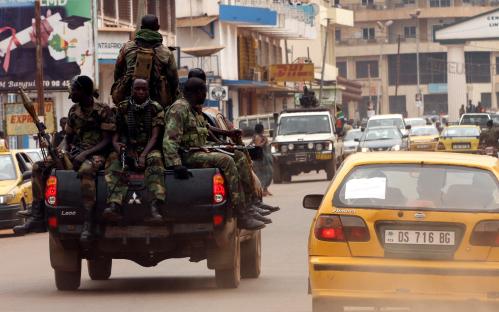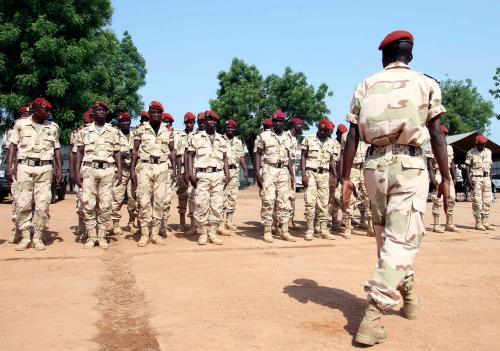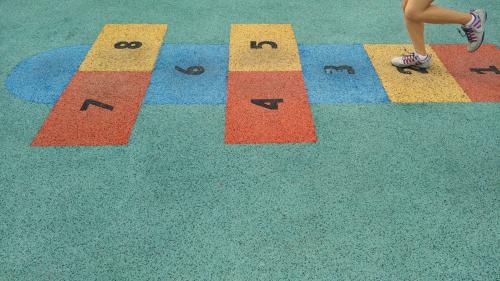The recent presidential election in the Central African Republic (CAR) was a near-miraculous success. Not only was it generally peaceful, despite the presence of numerous armed militias, but the result was also a rarity in the region—a president chosen in a genuinely democratic process in which the result was not preordained. The result is that Faustin Touadéra took office with a surprising degree of political legitimacy.
The international community responded by initiating the design of a long-term, integrated rebuilding program in conjunction with the government, one aimed at restoring the government’s traditional role as preeminent provider of security and social services. The design of these programs has taken months, but is expected to furnish the conceptual basis for the CAR Donors and Investors Conference in Brussels on November 17.
In the meantime, however, the general optimism of the election period has dissipated. Popular hopes for rapid security and economic improvements, though unrealistic, have not been met. A key problem is political stagnation. Caught between an emboldened political Bozizé clan, on the one hand, and growing intransigence from ex-Séléka militia factions, on the other, the government finds itself in a complex, volatile, and precarious situation.
Additionally, there is a second problem: the lack of organized and active government-population dialogue about how to involve localities in the rebuilding effort. Indeed, the “donor-centric” nature of current recovery planning has unintentionally weakened links between the new government and the population. Of course, in theory, donor recovery planning is “government-led.” In the CAR’s current reality, however, government officials inevitably focus on meeting with donors and preparing presentations for the November Brussels donors’ conference. Further, that planning assumes that since the government has neither revenue nor capacity, recovery will depend on implementation from donors. This approach unfortunately reinforces a mentality that donors, not the population, are its “customers.”
The best way for the government to succeed in serving the population’s immediate-term needs and desires is to enable the population itself to play a role in locally driven recovery.
The best way for the government to succeed in serving the population’s immediate-term needs and desires is to enable the population itself to play a role in locally driven recovery. Concentrating efforts on building successful arguments for big-ticket donor support for programs to rebuild a service infrastructure controlled by the Bangui-based central government won’t help.
The above critique is not meant to imply that the Central Africans should go it alone, pulling themselves up by their own bootstraps. It does, however, mean that donor assistance must not completely supplant a domestic process. Even if eventually successful, high-level recovery objectives, such as restoring government, will require longer periods of time to demonstrate any success. In the meantime, both donor confidence and popular goodwill can dwindle in the face of limited results. The priority focus now, therefore, should be on building Central Africans’ recognition and confidence that there is much they can do without significant outside support, if they organize themselves to do so.
The good news: The development of local initiative
Despite concerns about dwindling aid and diminished international attention to the CAR, there is a positive development in Central African society that has real potential. The complete breakdown of authority during the Séléka era has encouraged the emergence of bottom-up approaches to solving problems. Born out of years of living with a weak or absent state, this movement began and was given a powerful boost by civil society organizations such as the interfaith peace platforms and homegrown local initiatives.
Now, with significant training and support from nongovernmental organizations such as Search for Common Ground, Mercy Corps, and the Danish Refugee Council, these “Peace and Mediation Committees” play a bigger role throughout the country. While initially their focus was on community reconciliation, due to the absence of traditional authority, they have increasingly taken on aspects of local government. In so doing, they are helping to empower the population and end the extreme deference to government authority inherited from colonial times.
The key challenge for the country today, therefore, is how to unite these still-local, disconnected, and informal self-governance initiatives into a more cohesive, national framework—one in which government and civil society are partners, not ruler and subject. Getting there will require government leaders to redirect their focus to view the population, not the donors, as their core customers.
The problem is not that the Bangui élite are necessarily opposed to such an approach – it is rather that they have no experience with it. They are trained in old-school French administration, hierarchical and centralized, and day-to-day work pressures in Bangui drive them to operate in line with the status quo. Additionally, knowledge of issues outside of the capital city is limited. Few of them have spent more than a few days at a time outside of the capital in years—they know Paris better than Bambari.
There is certain urgency to this challenge given plans for local/regional elections and in theory government decentralization. Despite the success of the presidential election, an attempt to graft local elections onto the existing system—one that is hierarchical, centralized, and historically dysfunctional—will almost surely fail. Both the élite and the local population need to prepare for a different conceptual framework, one where local leadership is primarily about coordinating local responses to local problems.
In the short term, only locally led responses can put in place the beginnings of stability that will allow the longer-term, donor-funded projects to succeed. The transition away from a “donor-led” to a domestic-led recovery effort should build on recent successes in building grassroots organizations in response to the conflict. The international community, however, can still play an important role in helping the government perceive these efforts as not simply transitory, band-aid responses that will disappear as “traditional” government returns. Rather, they are the inception of a new approach to governance that will help the Bangui government reconnect with the population, and vice versa.
Editor’s note: Larry Wohlers is a retired foreign service officer, former MINUSCA Deputy SRSG, former ambassador to the CAR, and current senior advisor to Search for Common Ground. Please join Brookings, Search for Common Ground, and Mercy Corps in hosting President Touadera at the September 27 event, “Reconciliation and recovery in the Central African Republic: A conversation with His Excellency President Faustin-Archange Touadéra.” For more on the economic recovery of the Central African Republic, see the Brookings report Emerging from crisis: The role of economic recovery in creating a durable peace for the Central African Republic.
The Brookings Institution is committed to quality, independence, and impact.
We are supported by a diverse array of funders. In line with our values and policies, each Brookings publication represents the sole views of its author(s).






Commentary
Helping Central Africans through the transition from donor-dependent failed state to a community-led recovery
September 23, 2016